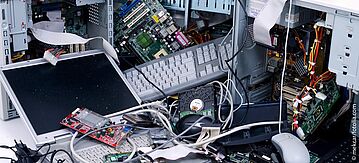"Electrical appliances must not be disposable items"
Federal Environment Minister Barbara Hendricks has called for binding European targets for resource efficiency. "The European Commission must put greater effort into promoting products that are durable, reparable and recyclable/ the durability, reparability and recyclability of products", said Minister Hendricks today at the opening of the 3rd European Resources Forum (ERF) in Berlin. "The Ecodesign Directive is a powerful tool for prescribing the minimum durability of certain parts subject to wear." Modular design for products and the long-term availability of spare parts were also important "to ensure that electrical appliances are not treated as disposable items," she continued. At the 3rd European Resources Forum today and tomorrow, around 400 participants from the fields of politics, business and research will discuss strategies for the sustainable use of natural resources.
Minister Hendricks commented: "By adopting the Paris Agreement on climate change, we have taken a fundamental decision on resource efficiency. Since the supply is finite, we need a fundamental change in our approach to resource consumption. The necessary concepts, tools and technologies for resource efficiency already exist. It is time for politics, business and society to act boldly!"
The advantages of the sound use of resources are demonstrated by this year's winners of the German Environmental Award (Deutscher Umweltpreis): for its new recycled concrete, the Feeß company needs 30 percent less raw materials than conventional concrete. The company Fairphone makes smartphones that are easy to repair and recycle, while at the same time implementing environmental and social standards in production.
The Federal Government's goal is to decouple prosperity and economic growth from resource consumption. To achieve this, the Federal Government updated the German Resource Efficiency Programme (ProgRess) of 2012 for the first time this year and adopted "ProgRess II" on 2 March 2016. This new programme evaluates progress and sets out the priorities for action for the next four years. The Federal Government is also strengthening international cooperation on resource efficiency. In 2015 Germany used the summit of its G7 presidency at Schloss Elmau as an opportunity to be the first to put resource efficiency on the agenda of the heads of state and government of the seven largest economic powers, and established the G7 Alliance on Resource Efficiency.

